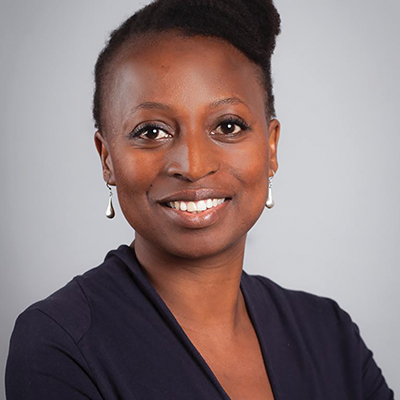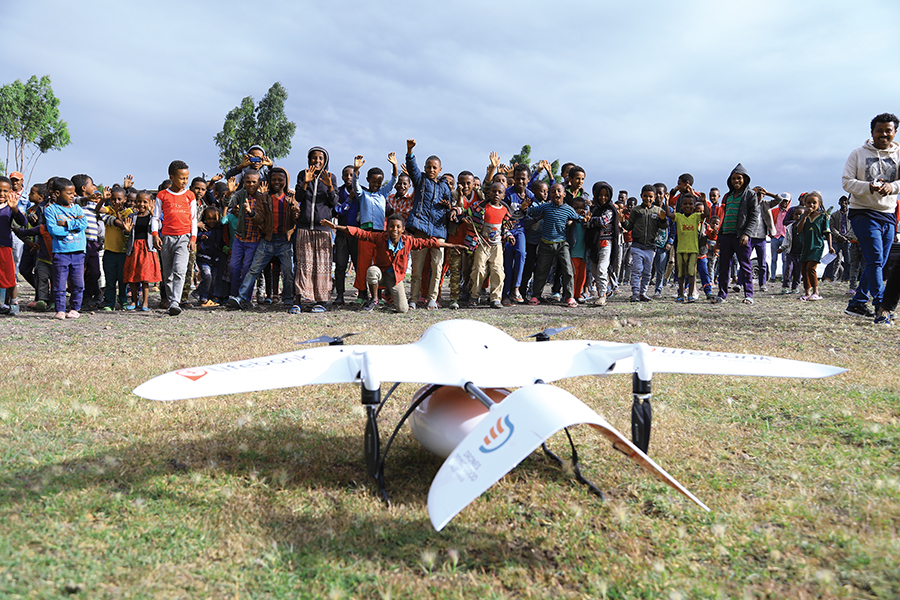Three years ago, Tendai Pasipanodya learned about drones being used to solve problems in Africa. Her visionary mind wondered if drone technology could offer the same leapfrog opportunity for the continent as mobile phone technology had done 15 years before.
She was convinced that if the technology was successfully localized, it would be a game-changer for the continent. She set about finding partners and building the alliances necessary to make it happen.
Pasipanodya is a director of Endeva, an international, women-led boutique consultancy based in Germany and the United States. The company is on a mission to make the global economic transformation inclusive and fit for the future. For 13 years, Endeva has been researching ways to harness the power of business to solve problems in low- and middle-income countries, successfully implementing more than 150 different projects on behalf of public, private, and nonprofit organizations.
Their business approach is bold — one of system change — a strategy that tackles problems at scale by reconfiguring relationships, functions, incentives, and motivations within an economic system. Pasipanodya looked at drones in Africa and recognized the untapped potential of aerospace on the continent. She reached out to aviation giant Airbus and a meeting with Rey Buckman, co-creator of the Airbus #Africa4Future program, gave her the break she’d been looking for. The program supports African entrepreneurs in the aerospace sector, and together, they started brainstorming ideas. They organized a drone track at Endeva’s ii2030 (inclusive innovation 2030) event, and the attention they drew resulted in the founding of the Drones Doing Good Alliance. Partners include Airbus, pharmaceutical company, Merck, African technology and health-logistics startup, LifeBank, and leading drone expert Hans Peter Thamm, founder of Geotechnic.

“I believe in the power of African entrepreneurs in solving challenges on the continent. By matching them with the right partners, we enable them to achieve impact at scale.” — Tendai Pasipanodya
One of their first discussions was how to use drones for healthcare delivery. While this was a great idea, the alliance was also sensitive to maximizing the impact by combining drones with other low cost transport options. “Just because a drone can deliver blood doesn’t necessarily mean we should,” she says. “Sometimes, a motorcycle can do the job, and drones can be used where other options won’t work.” Their balanced use of smart drone technology is wise when viewed against the limited healthcare budgets of developing countries, and the fact that manual jobs give much-needed employment to economically deprived communities.
“Knowing when to use drones and when not to is key to the smart and cost-effective use of this technology in Africa,” adds Pasipanodya. The first project chosen by the alliance was centered around Lifebank, that wanted to expand its delivery of critical healthcare products to include drones. The project was co-financed by DDG Alliance partners and the UK government’s Business Partnerships Fund.
The Problem
Each year in hospitals across low- and middle-income countries, thousands of people die from a lack of essential medical products, such as blood and oxygen. Many cannot be found in time or are in an unusable condition. Access to these critical products is one of the World Health Organization’s building blocks for strengthening health systems and remains a challenge in Africa. The continent also leads the world in maternal and child mortality — 546 maternal deaths per 100,000 live births, and 100 deaths per 1,000 births for those under age five.
The Solution
Temie Giwa Tubosun is the founder of LifeBank. Her tech-savvy logistics company cleverly combines high tech with low tech to save lives. The organization uses data, smart logistics, and a combination of ubiquitous technology, such as mobile phones, motorcycles, AI, and blockchain to help health workers find essential medical products. They can deliver blood in less than 45 minutes in a cold chain that is compliant with the World Health Organization’s blood transfusion guidelines.
Scanning the SmartBag tag on a pint of blood gives a hospital vital information about the donation, collection, screening, storage, and delivery details. Since its inception, they have delivered more than 19,000 units to 400 hospitals across two cities in Lagos and Abuja, saving 6,500 lives. Through the Drones Doing Good Alliance, Lifebank is adding drones to its delivery fleet this year.
The Success
LifeBank became the first African-led company to achieve bi-directional Beyond Visual Line of Sight (BVLOS) flights for healthcare logistics on the continent. The findings were documented in a publication called When to Use Drones, and the team is now developing a program called Skybank that will automate decisions on which mode of delivery to use at the most cost-efficient price, to save as many lives as possible.
What’s Next?
Without extensive legacy infrastructure, Africa can adopt new networks more quickly, without costly system overhauls. While Pasipanodya is convinced about this leapfrog potential for Africa, many constraints remain: regulations, high cost of technology, and localization of drone technology. The Drones Doing Good Alliance has identified three key development areas for the future. The first is to help draft regulation to make Africa the safest place to fly drones. The second is to drive down the cost of drones by supporting local design, manufacturing, and maintenance. The third is a multi-country pilot program that will see drones used alongside other transport methods to deliver life-saving products.
So, what are you waiting for? The drone market in Africa is open for business. www.Endeva.org




































